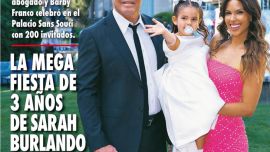After a year-and-a-half of silence due to the coronavirus pandemic, the sounds of the Latin Vox Machine orchestra have returned to a house in Buenos Aires.
The group – made up of Venezuelans who fled their country's economic crisis to Argentina – is preparing for a performance of the "El Principito Symphonic" ("Symphonic Little Prince"), a symphony they created during the lockdown, and that they released on disc at the end of July.
The violas are rehearsing in the living room, while the violins are in the kitchen. Later, the keyboards and choir will take their places to practice.
They hope to play their symphony in public for the first time in November.
The orchestra's director Enmanuel González can hardly wait.
"The Little Prince is a beautiful project. It was a labour of quarantine and was also an escape, it was all that we thought about," he said. "I'm really looking forward to it and cannot wait to present it."
Inspired by the novella The Little Prince by French author Antoine de Saint-Exupéry, the Symphonic Little Prince is an original composition created by the 120-strong Venezuelan orchestra, whose members arrived in Argentina four to five years ago.
They were among the millions of people who fled the crippling economic and political crises in their home country.
Most of the Latin Vox Machine orchestra were trained in Venezuela's prestigious El Sistema programme, where Gustavo Dudamel, the new director of the Paris Opera, also began his training.
Yet after arriving in Argentina, many earned a living busking in the Buenos Aires metro.
'What gives us power'
One of them, Omar Zambrano – who lives in the house where the orchestra rehearses – came up with the idea of forming a Venezuelan musical troupe.
But the coronavirus plunged the orchestra into "a dark period" from which they have only emerged thanks to their composition, said Zambrano, the group's executive director.
"We thought about it before the pandemic, but we didn't manage to do it because the composition and arrangements take a lot of time. It's the result of many wills: the composers, the arrangers, the performers, the director. Little by little, it was developed during the pandemic, piece by piece as the quarantine rules were relaxed."
During this time, they also launched an online music school: Latin Vox Academy, to help the musicians earn some money.
"We probably wouldn't be doing what we're doing without the trauma of displacement and the pandemic," said Zambrano. "Turning bad into good is what gives us power. Turning trauma into joy is an art."
When things were at their toughest, the orchestra received help from the United Nations High Commissioner for Refugees (UNHCR) and the International Organisation for Migration (IOM).
"The Covid-19 pandemic exacerbated the vulnerability of the migrant and refugee population. Most of these people work in the informal sector and were openly affected by the health measures," said UNHCR representative Juan Carlos Murillo.
But the Latin Vox Machine project "allowed them to continue working and interacting. It is a reliable example of the courage, determination and resilience of refugees and migrants," he added.
After Syria, Venezuela has produced the second-largest number of displaced people in the world, with 5.6 million fleeing since 2015, according to a UNHCR estimate. Around 185,000 of them live in Argentina.
A 'blessing'
Singer Isa Ramos and orchestra coordinator César Pérez kept in contact with the musicians during the pandemic to look after their needs.
"We created a network and organised a huge collection with wonderful families," said Ramos. "We paid several people's rent for several months. We looked after medical situations, surgeries."
They also bought Christmas presents for the musicians' children.
Violinist María Andreyna Chávez says the orchestra was a "blessing" during the months of lockdown in Argentina, and she never stopped rehearsing on Sundays.
"It's the unity, seeing each other again, after so much time, to hear each other again," said Chávez. "We've been really blessed with The Little Prince. It gave us a lot: a goal, a continuation, a succession."
Zambrano agrees.
"This dynamic of rehearsing, following an artistic objective, is a privilege that we treasured and shared," he said. "The rehearsals were worth more even than the concerts."
related news
by Nina Negrón, AFP























Comments